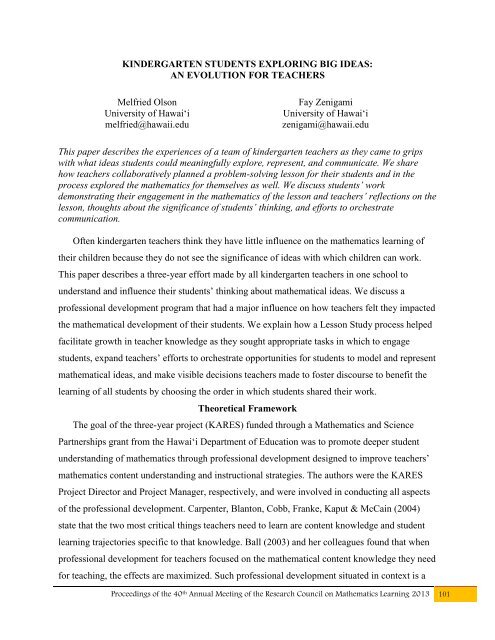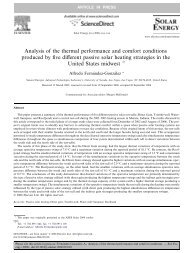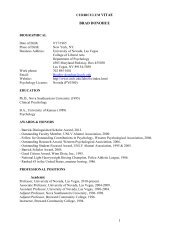2013 Conference Proceedings - University of Nevada, Las Vegas
2013 Conference Proceedings - University of Nevada, Las Vegas
2013 Conference Proceedings - University of Nevada, Las Vegas
- No tags were found...
Create successful ePaper yourself
Turn your PDF publications into a flip-book with our unique Google optimized e-Paper software.
KINDERGARTEN STUDENTS EXPLORING BIG IDEAS:AN EVOLUTION FOR TEACHERSMelfried Olson<strong>University</strong> <strong>of</strong> Hawai‘imelfried@hawaii.eduFay Zenigami<strong>University</strong> <strong>of</strong> Hawai‘izenigami@hawaii.eduThis paper describes the experiences <strong>of</strong> a team <strong>of</strong> kindergarten teachers as they came to gripswith what ideas students could meaningfully explore, represent, and communicate. We sharehow teachers collaboratively planned a problem-solving lesson for their students and in theprocess explored the mathematics for themselves as well. We discuss students’ workdemonstrating their engagement in the mathematics <strong>of</strong> the lesson and teachers’ reflections on thelesson, thoughts about the significance <strong>of</strong> students’ thinking, and efforts to orchestratecommunication.Often kindergarten teachers think they have little influence on the mathematics learning <strong>of</strong>their children because they do not see the significance <strong>of</strong> ideas with which children can work.This paper describes a three-year effort made by all kindergarten teachers in one school tounderstand and influence their students’ thinking about mathematical ideas. We discuss apr<strong>of</strong>essional development program that had a major influence on how teachers felt they impactedthe mathematical development <strong>of</strong> their students. We explain how a Lesson Study process helpedfacilitate growth in teacher knowledge as they sought appropriate tasks in which to engagestudents, expand teachers’ efforts to orchestrate opportunities for students to model and representmathematical ideas, and make visible decisions teachers made to foster discourse to benefit thelearning <strong>of</strong> all students by choosing the order in which students shared their work.Theoretical FrameworkThe goal <strong>of</strong> the three-year project (KARES) funded through a Mathematics and SciencePartnerships grant from the Hawai‘i Department <strong>of</strong> Education was to promote deeper studentunderstanding <strong>of</strong> mathematics through pr<strong>of</strong>essional development designed to improve teachers’mathematics content understanding and instructional strategies. The authors were the KARESProject Director and Project Manager, respectively, and were involved in conducting all aspects<strong>of</strong> the pr<strong>of</strong>essional development. Carpenter, Blanton, Cobb, Franke, Kaput & McCain (2004)state that the two most critical things teachers need to learn are content knowledge and studentlearning trajectories specific to that knowledge. Ball (2003) and her colleagues found that whenpr<strong>of</strong>essional development for teachers focused on the mathematical content knowledge they needfor teaching, the effects are maximized. Such pr<strong>of</strong>essional development situated in context is a<strong>Proceedings</strong> <strong>of</strong> the 40 th Annual Meeting <strong>of</strong> the Research Council on Mathematics Learning <strong>2013</strong> 101




